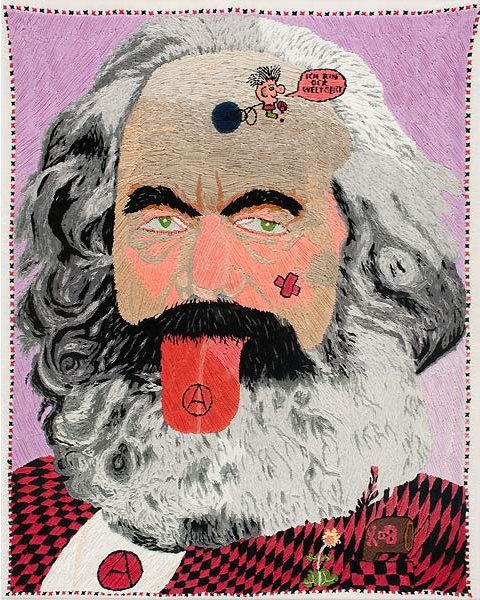Whose city is it, anyway?
dal 21/2/2013 al 31/8/2013
Segnalato da
21/2/2013
Whose city is it, anyway?
Munchner Stadtmuseum - Sammlung Fotografie, Munich
Manifestations of new social movements in Munich in the 1970s. An exhibition in conjunction with the Archive of the Munich Labor Movement. The show opens with a deliberately fragmented albeit spatially compact look at Germany's extra-parliamentary opposition (APO) during the 1960s.

Over the past twelve years or so, there has been a revival of interest among historians and social scientists in source-based reappraisal of the Federal Republic of Germany during the 1970s. Such an approach pays particular attention to aspects of everyday life that had played a far less prominent role in studies of previous decades. Thus transformations in social and political interactions as reflected in everyday life are portrayed as resulting from demands for radical change and a constant and pervasive ‘bottom-up’ reform process. These changes went far beyond the statutory liberalization of individual freedoms and political participation. The social-liberal coalition government’s Identikit image of the ‘responsible citizen’ came to the fore at a time when the 1973-74 economic crisis was causing the ‘top-down’ approach to social transformation to stall and the ‘internal security’ model, long conceived of as a means of combatting social unrest, was gaining the upper hand.
This exhibition brings these large-scale phenomena of the 1970s to life by presenting vivid examples of manifestations of new social movements in Munich. It opens a window on different approaches to the development of the city as a collective living space and venue for experimenting with new and as-yet untested forms of social organization. All of the phenomena portrayed were heavily influenced by a liberal approach to the use of urban living spaces, as people sought to promote participation and development, self-determination and grassroots democracy. The exhibition showcases several of the models developed during the 1970s as an alternative to an understanding of the city purely as a vehicle for economically-motivated considerations and interests.
The exhibition opens with a deliberately fragmented albeit spatially compact look at Germany’s extra-parliamentary opposition (APO) during the 1960s and the anti-authoritarian movements and ideas that it generated.
The exhibition then goes on to trace the ways in which this inspired individuals and groups to empower themselves by taking action in support of emancipation:
* in the cultural arena: underground explosion, performance art and the free art fair;
* in the political arena: formation of grassroots groups and neighborhood initiatives, grassroots worker organizations within companies, protests organized by students, schoolchildren and apprentices against education reforms, and initiatives to support the fight against colonialism and dictatorships;
* in the counter-public sphere: production and dissemination of literature, development of an independent press and the means of fighting legal challenges;
* with regard to the curtailing of basic democratic rights: formation of committees and running of information campaigns, defense lawyer initiatives, action committees (‘Aktionsgemeinschaften’);
* in the realm of the ‘Life in the City’: citizens’ action groups and tenant protests, squatting as protest against unoccupied buildings and the demolition of old housing developments, decentralized youth work and self-run youth centers, autonomous social work, work to support foreign members of the community;
* in the realm of alternative lifestyles, ways of working and cultures: self-managed businesses and workers’ collectives, housing projects, district community centers, free theater, artist collectives, street music and contemporary folk music;
* in the realm of the women’s, lesbian and gay movements: campaigns against preconceived sexual mores; the fight against moral and legal constraints (Articles 218 and175); the establishment of centers and media for women and the gay and lesbian communities;
* with regard to the environmental, anti-nuclear power and peace movements, conscientious objectors and the new solidarity movement;
* with regard to the new youth culture movement that sprang up during the late 70s and early 80s.
Approximately 650 items have been loaned to the exhibition from Munich archives and private collections. The exhibition has provided the opportunity for the first full evaluation of the Archiv 451 archive (also known as the Trikont-Archiv), donated to the Archive of the Munich Labor Movement in 2011.
A number of items were also donated to the Münchner Stadtmuseum in the course of the research for the exhibition. These included a complete set of issues of the legendary Munich magazine BLATT (273 issues published between 1973 and 1984), as well as items of furniture from a 1979 Munich apartment share. Furthermore, the exhibition offers the first opportunity to view, in Munich, a collection of posters and photos relating to Aktionsraum 1, a well-known venue for avant-garde art between 1969 and 1970.
The exhibition is supported by the Museum’s media partner, the Munich University of Television and Film, founded in 1967. The University has kindly provided us with a selection of movies made by students for their final exams during the 1970s which will be screened in the movie theater inside the exhibition.
The exhibition’s other media partner is the Bayerischer Rundfunk radio station’s youth magazine program ‘Zündfunk’. It will provide audio stations for visitors to listen to historical excerpts from programs broadcast during the 1970s together with a constantly updated live stream of the latest broadcast from the previous day.
The Munich Film Museum has contributed a series of publications from the Munich screenwriters’ publishing house Verlag der Filmautoren, München. Throughout the duration of the exhibition, the Werkstattkino movie theater will show a selection of the movies that it had screened during the 1970s. The exhibition flyer contains details of other events organized in conjunction with the exhibition.
Image: Embroidered portrait of Karl Marx from the community book store in Adalbertstraße street, around 1978, © Münchner Stadtmuseum
Press contact:
Ulla Hoering - Gabriele Meise - Anja Scherz
Tel. +49-(0)89-233-22994 Fax +49-(0)89-233-25033 E-mail presse.stadtmuseum@muenchen.de
Opening: February 22, 2013, 7 pm
Münchner Stadtmuseum / Photography Collection
St.-Jakobs-Platz 1. D-80331 Munich
Tuesday-Sunday 10.00 a.m. - 6.00 p.m.
Closed on Mondays
Admission:
Adults (eighteen and over) €6
Students, seniors, disabled €3
Children (under eighteen), school classes admission free



